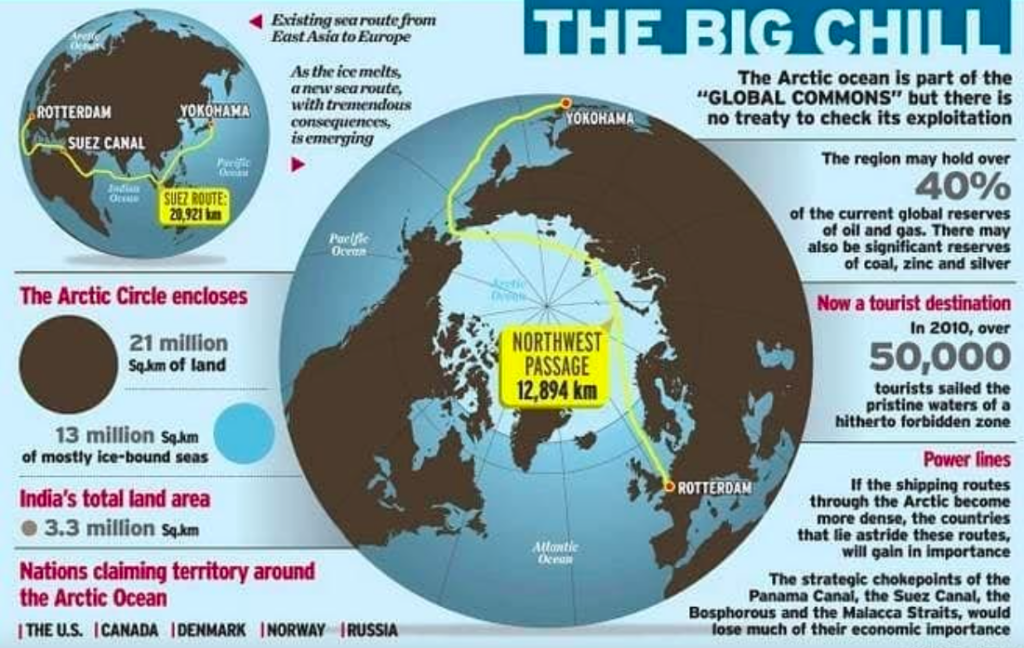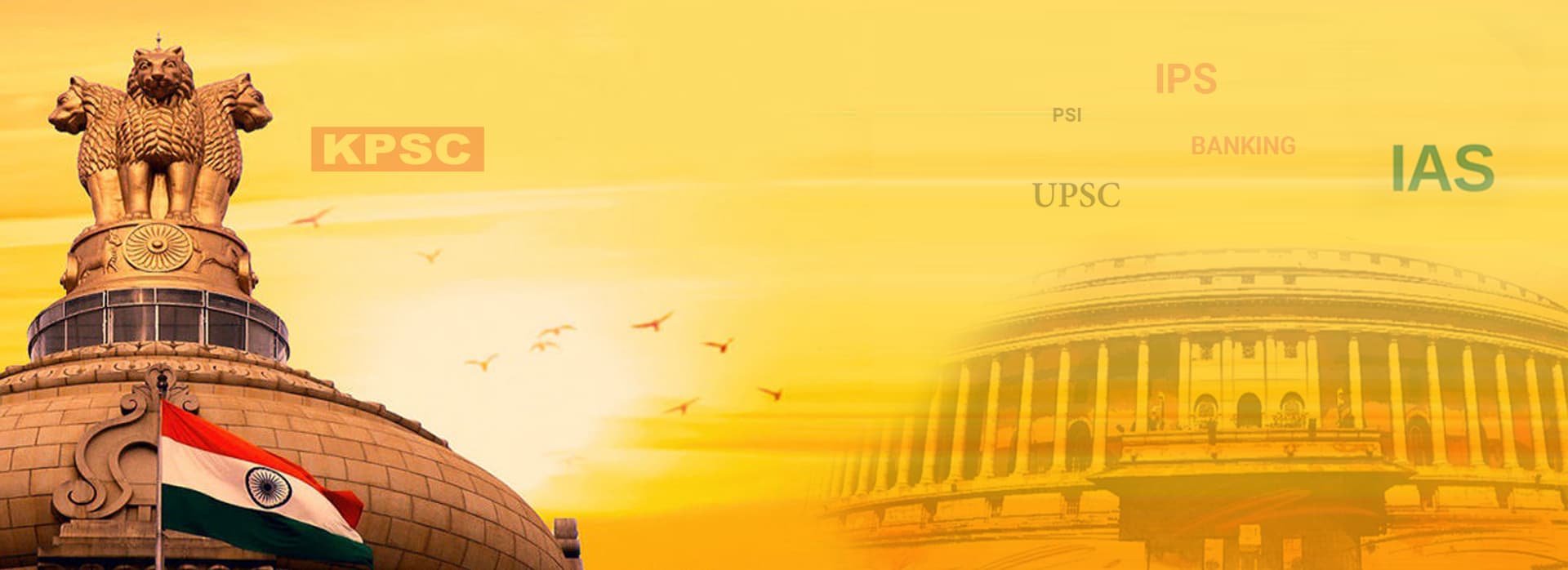INDIA MUST RETHINK ITS ARCTIC OUTLOOK
Relevance: GS 2 – Bilateral, regional and global groupings and agreements involving India and/or affecting India’s interests
Why in the News?
- The Arctic, traditionally a zone of scientific collaboration and environmental preservation, is witnessing rising geopolitical tensions.
- Military and strategic competition in the region is intensifying due to shifting global power dynamics.
- Russia has become increasingly assertive in expanding its military and economic footprint in the Arctic.
- China is stepping up its Arctic engagement through infrastructure investments and scientific missions, despite not being an Arctic nation.
- The United States is showing renewed strategic interest in Greenland and Arctic governance.
- As global conflict zones grow, the Arctic is emerging as a new theatre of international rivalry and strategic contestation.

Arctic’s Strategic Shift: Key Drivers
- The Arctic’s transition from a peripheral zone to a focal point of global power politics is driven by more than geopolitical rivalries.
- Climate change has played a crucial role by melting ice and making the region more accessible.
- New maritime routes and resource frontiers have emerged, prompting a race for access and control.
- The Northern Sea Route (NSR), previously navigable only during brief summer periods, is now nearly a year-round passage.
- Rising traffic along the NSR could reshape global trade routes, enhancing the Arctic’s strategic and economic significance.
Concerns
A Growing Militarisation in the Arctic
- The Arctic is witnessing increasing militarisation, with states reopening military bases, deploying submarines, and making assertive territorial claims.
- This militarisation accompanies the region’s growing commercial and strategic value.
- The trend of using Arctic presence for broader geopolitical leverage is not new but is gaining momentum.
- In 2019, S. President Donald Trump’s proposal to buy Greenland—though ridiculed—reflected a strategic recognition of the Arctic’s centrality to global power dynamics.
| Implications for Non-Arctic Powers and India ●For non-Arctic states like India, the militarisation of the Arctic presents serious strategic implications.●However, India remains largely detached from the region’s shifting security dynamics, focusing instead on challenges closer to home.●New Delhi’s response has been largely passive, despite the growing importance of the Arctic in global geopolitics. |
India’s Arctic Policy 2022: Strengths and Gaps
- India’s 2022 Arctic Policy emphasizes climate science, environmental protection, and sustainable development.
- It draws conceptual strength from similarities between the Arctic and the Himalayan “Third Pole” linking polar changes to South Asia’s water and monsoon systems.
- However, the policy understates the strategic and security shifts occurring in the region.
The Risk of Marginalisation
- As Arctic powers pivot from cooperative science to geopolitical contestation, India’s neutral, science-focused approach risks marginalisation.
- The earlier approach of staying apolitical now seems outdated given the changing geopolitical landscape.
- India is absent from major strategic dialogues on Arctic access and governance.
- India remains detached from the emerging politics of influence in the Far North.
India’s Presence: Limited and Outdated Tools
- India maintains a research station in Svalbard, participates in polar expeditions, and holds observer status in the Arctic Council.
- These tools were designed for a more cooperative Arctic order — one built on consensus and mutual trust, that is now rapidly eroding.
- With the rise of military and political contestation, scientific diplomacy alone may no longer be adequate for protecting India’s interests.
Diplomatic Challenges and Recalibration Needs
- Nordic countries are increasingly uneasy about India’s close ties with Russia, particularly in the wake of the Ukraine conflict.
- India has yet to clearly communicate how its stance of strategic autonomy can align with Arctic partners’ expectations and serve mutual interests.
- A more balanced and proactive Arctic engagement is essential if India wishes to play a credible and constructive role in the evolving polar order.
A Constructive Role for India: Strategic Imperatives
- India’s interests in the Arctic are tangible, not theoretical — the rise of the Northern Sea Route (NSR) could redirect global trade away from Indian Ocean sea lanes, threatening India’s strategic and economic relevance.
- If Russia and China consolidate control over Arctic routes, India’s vision of becoming a connectivity hub in the Indo-Pacific—via SAGAR and IPOI—may be undermined.
Blurring Boundaries: Arctic-Indo-Pacific Linkages
- The strategic divide between the Arctic and the Indo-Pacific is narrowing.
- Russia-China cooperation in the Arctic, combined with China’s naval expansion in the Indian Ocean, is forcing India to rethink its focus on the southern maritime domain.
A More Purposeful Arctic Engagement: Strategic Recommendations
Recalibration Needed: India must evolve its Arctic approach to retain its climate-conscious ethos while adopting a sharper strategic focus in light of shifting geopolitical dynamics.
Three-Part Strategy for Enhanced Engagement
1.Institutionalise Arctic Engagement
○Establish dedicated Arctic desks in the Foreign and Defence Ministries.
○Facilitate regular inter-agency coordination on Arctic affairs.
○Engage strategic think tanks for policy research and scenario planning.
2.Collaborate on Dual-Use Initiatives○Partner with like-minded Arctic states on areas like Polar logistics, Maritime domain awareness, Satellite monitoring.○These initiatives enhance strategic presence without triggering alarm.
3.Claim a Voice in Emerging Governance Forums
○Proactively seek participation in new platforms dealing with Infrastructure development, Shipping regulations, Digital standards, Blue economy frameworks.Approach Arctic politics with cultural sensitivity and community engagement, avoiding an extractive or aggressive posture.
Reality Check and Future Outlook
- India’s current Arctic approach, grounded in scientific diplomacy, has merit but is increasingly outdated.
- Relying on climate cooperation alone is insufficient as power dynamics begin to shape the Arctic order.
- Failure to adapt could leave India marginalised in one of the most strategically vital frontiers of the 21st century.
Source: https://www.thehindu.com/opinion/op-ed/india-must-rethink-its-arctic-outlook/article69538328.ece
Mains question
Discuss the strategic significance of the Arctic region in contemporary geopolitics and evaluate India’s Arctic Policy in the context of emerging security and governance challenges. (250 words)





